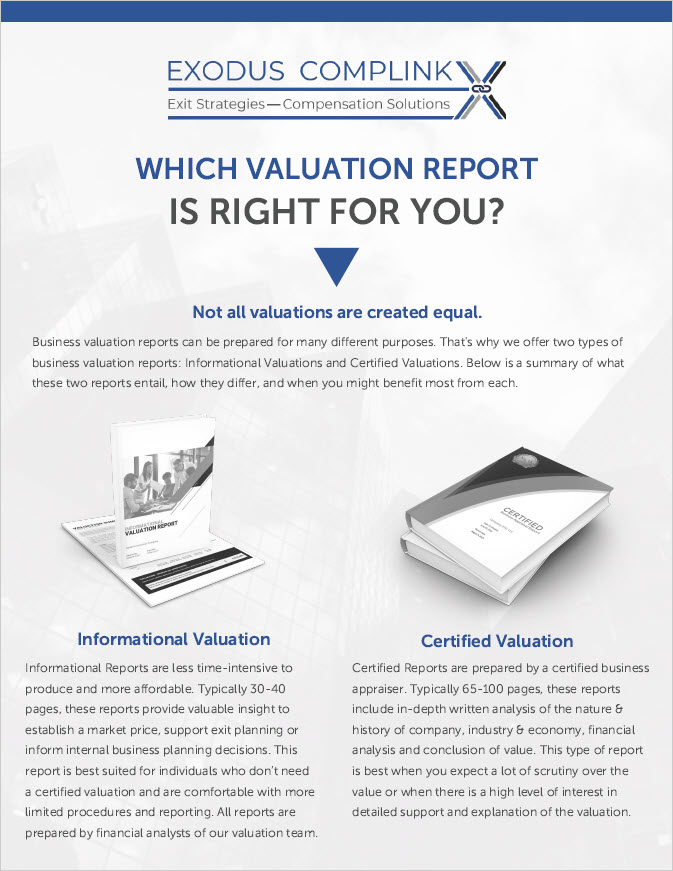‘Rules of Thumb’ are a quick and accurate way to value my business.
The Rules of Thumb Method is a theoretical market derived units of comparison. Trade associations develop rules of thumb related to the businesses of their members. An example of a rule of thumb is ‘60% of annual sales’ – this means the value of XYZ Company in ABC industry is worth ‘60% of annual sales.’ While rules of thumb can give a “quick and dirty” approximation of the value of a business, there use introduces unnecessary, and potentially costly, risks. Limited knowledge of the actual transactions and terms in which the rules of thumb are based can lead to either an undervalued business, resulting in lost cash and credibility, or an overvalued business, resulting in no sale. Because of these problems, rules of thumb should be avoided.
All business valuations are equal.
Many believe that if they pay money, no matter how little, for a business valuation then it is credible and reliable. This is a common misconception. Valuation reports from uncertified individuals and firms not adhering to professional valuation standards typically overemphasize financial ratios and market-based valuation approaches. Some of these reports are very flashy and professional-looking, but lack basic analysis and support for the valuation. While these valuations are likely very cheap, they are insufficient and will not hold weight with knowledgeable third parties (i.e., IRS, courts, buyers, banks, etc.), which can cost you in credibility and money. As the old saying goes, if something is too good (or cheap) to be true, then it probably is.
My CPA can value my business
While CPAs can be extremely knowledgeable in their area of practice, most are not working, certified business valuators. If your CPA is not a certified business valuator, then the valuation report will not be as credible or hold the same weight with third parties, exposing you to unnecessary risks. To eliminate the risk of receiving an insufficient and an uncreditable valuation, you want to ensure the firm you engage is up-to- speed on changes in professional valuation standards, knowledgeable of applicable legal case rulings, and have access to the market transactional and comparable databases necessary to conduct your business valuation. One way to do this is to ask the firm what professional standards they follow for business valuations, do they employ certified business valuators or do they subscribe to leading databases that provide private company benchmarks and historical transaction data for your industry and geographic region.
The value of my business is equal to its assets minus liabilities (net worth) of the business
Most agree that this method has serious flaws and can materially undervalue your business. This book value method is based on the financial accounting concept that owner’s equity is determined by subtracting the book value of a company’s liabilities from the book value of its assets. Under generally accepted accounting principles (GAAP), most assets are recorded at historical cost (not current) and is further reduced by accumulated depreciation. Also, GAAP does not permit the recognition of numerous infrequently valuable assets such as internally developed trademarks, tradenames, logos, etc. or future growth of the company.
I don’t need a valuation to sell or buy my business.
While a business valuation is not required to sell or buy a business, it is a great way to avoid overpaying or leaving money on the table during negotiations. A business valuation from a firm adhering to professional valuation standards and employing certified valuators will arm you with the knowledge and confidence necessary to make informed decisions. Many of our clients spend a lifetime building their business and want to avoid the unnecessary risk of taking the spotlight off of what matters by not having reliable and credible information during.
Meet Our Leading Valuation Expert

Shelia Darby, MBA, CVA, MAFF
Affiliate Valuation Expert
Shelia Darby has 20+ years as an experienced valuation and financial professional. Ms. Darby is a recognized thought leader valuing complex initiatives and companies. She has worked on projects ranging from asset to company valuations. Past projects have included work for companies ranging from Fortune 500 to small, privately held businesses.
Ms. Darby provides certified valuation reports that deliver the insight and credibility needed to facilitate deal making and successful resolutions. As a certified business appraiser, she adheres to the high standards set forth by well-recognized, accredited organizations. For Exodus Complink, she provides the highest level of third-party financial analytics and valuation assistance.
Start the Process with a Free Consultation
Your engagement starts with a free consultation to discuss your valuation needs. You’ll engage directly with our team and will experience an organized and secure data collection process if you choose to move forward.
Call or text (210) 772-1086 or email us to schedule your free consultation.



